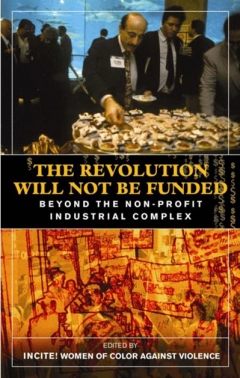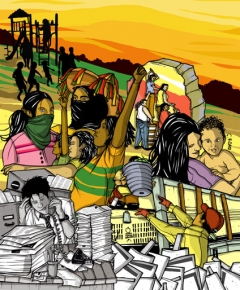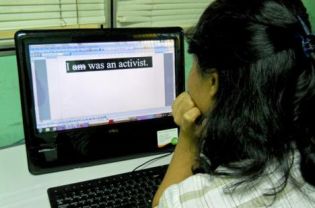The Revolution Will Not Be Funded
"I’m very much afraid of this ‘Foundation Complex.’ We’re getting praise from places that worry me." -Ella Baker, June 1963
"I want us all to be real creative about our tactics and strategies to dismantle the empire." – Joo-Hyun Kang, The Revolution Will Not Be Funded Conference, 2004
WHAT IS THE IMPACT OF THE NON-PROFIT INDUSTRIAL COMPLEX ON REVOLUTIONARY MOVEMENT BUILDING?
In this landmark collection, over 25 activists and scholars describe and discuss the non-profit industrial complex (NPIC)—a system of relationships between the state, the owning classes, foundations, and social service & social justice organizations that results in the surveillance, control, derailment, and everyday management of political movements.
Naming what some might call “the elephant in the room,” the contributors to this groundbreaking and thought-provoking collection critical assess the NPIC’s impact on the practice and imagination of the political left in the U.S. Of central concern is the emerging dominance of the 501(c)(3) non-profit, a model which some argue threatens to permanently eclipse autonomous grassroots-movement building in the arena of social justice.
The Revolution Will Not Be Funded addresses the following questions:
- What is the history of the non-profit model? What drove its development? How does it impact the form and direction of social justice organizing?
- How has reliance on foundation funding impacted the course of social justice movements?
- How does 501(c)3 non-profit status impact social justice organizations’ relationship to the state?
- How does non-profit status allow the state to co-opt and control our movements?
- Are there ways the non-profit model can be used subversively to support more radical visions for social change?
- What are the alternatives for building viable social justice movements? How do we resource our movements outside the non-profit structure?
- What models for organizing outside the NGO/non-profit model exist outside the U.S. that may help us?
INCITE! Women of Color Against Violence is a national activist organization of radical feminists of color advancing a movement to end violence against women of color and their communities through direct action, critical dialogue, and grassroots organizing. To learn more, please visit www.incite-national.org.
Available in April 2007 | 978-0-89608-766-8 | paper | 272 pages | $18
ORDERING INFORMATION:
The Revolution Will Not Be Funded is available from South End Press.
TABLE OF CONTENTS:
Introduction: The Revolution Will Not Be Funded, by Andrea Smith
Part One: The Rise of the Non-Profit Industrial Complex
1. The Political Logic of the Non-Profit Industrial Complex, by Dylan Rodríguez
2. In The Shadow of the Shadow State, by Ruth Wilson Gilmore
3. From Black Awakening in Capitalist America, by Robert L. Allen
4. Democratizing American Philanthropy, by Christine E. Ahn
Part Two: Non-Profits and Global Organizing
5. The Filth on Philanthropy: Progressive Philanthropy’s Agenda to Misdirect Social Justice Movements and the Just Redistribution of Wealth and Power, by Tiffany Lethabo King and Ewuare Osayande
6. Between Radical Theory and Community Praxis: Reflections on Organizing and the Non-Profit Industrial Complex, by Amara H. Pérez, Sisters in Action for Power
7. Native Organizing Before the Non-Profit Industrial Complex, by Madonna Thunder Hawk
8. Fundraising Is Not a Dirty Word: Community-Based Economic Strategies for the Long Haul, by Stephanie Guilloud and William Cordery, Project South: Institute for the Elimination of Poverty and Genocide
9. “we were never meant to survive”: Fighting Violence Against Women and the Fourth World War, by Ana Clarissa Rojas Durazo
10. Social Service or Social Change?, by Paul Kivel
11. Pursuing a Radical Anti-Violence Agenda Inside/Outside a Non-Profit Structure, by Alisa Bierria, Communities Against Rape and Abuse (CARA)
12. The NGOization of the Palestine Liberation Movement: Interviews with Hatem Bazian, Noura Erekat, Atef Said, and Zeina Zaatari, by Andrea Smith
Part Three: Reformulating The Role of Non-Profits
13. Radical Social Change: Searching for a New Foundation, by Adjoa Florência Jones de Almeida
14. Are the Cops in Our Heads and Hearts?, by Paula X. Rojas
15. Non-Profits and the Autonomous Grassroots, by Eric Tang
16. On Our Own Terms: Ten Years of Radical Community Building with Sista II Sista, by Nicole Burrowes, Morgan Cousins, Paula X. Rojas, and Ije Ude
BOOK REVIEWS & DISCUSSIONS:
- cripchick
- Kameelah Writes
- Left Turn Magazine
- Media Mouse: Grand Rapids Independent Media Center
- Solidarity
- WBAI New York: Pacifica Radio
- LiP Magazine
- The African American Literature Book Club
- The Nonprofiteer
- Zapagringo
- Resource Generation
- Windy City Times
- ZMag – Do Capitalists Fund Revolutions?
In These Times – Forget The Foundations Global Liberation The Front Line Philanthropy News Digest She Who Stumbles HIMAL SOUTHASIAN Rustbelt Radio Movement Vision Lab Feminist Review UTNE Reader
The Revolution Will Not Be Funded: Beyond The Non-Profit Industrial Complex is a winner of the 2007 Gustavus Myers Center Outstanding Book Award for Advancing Human Rights!
For more information about ideas and strategies, you can order audio recordings of the 2004 conference, The Revolution Will Not Be Funded: Beyond The Non-Profit Industrial Complex, or take a look at our resource page on this issue area.


